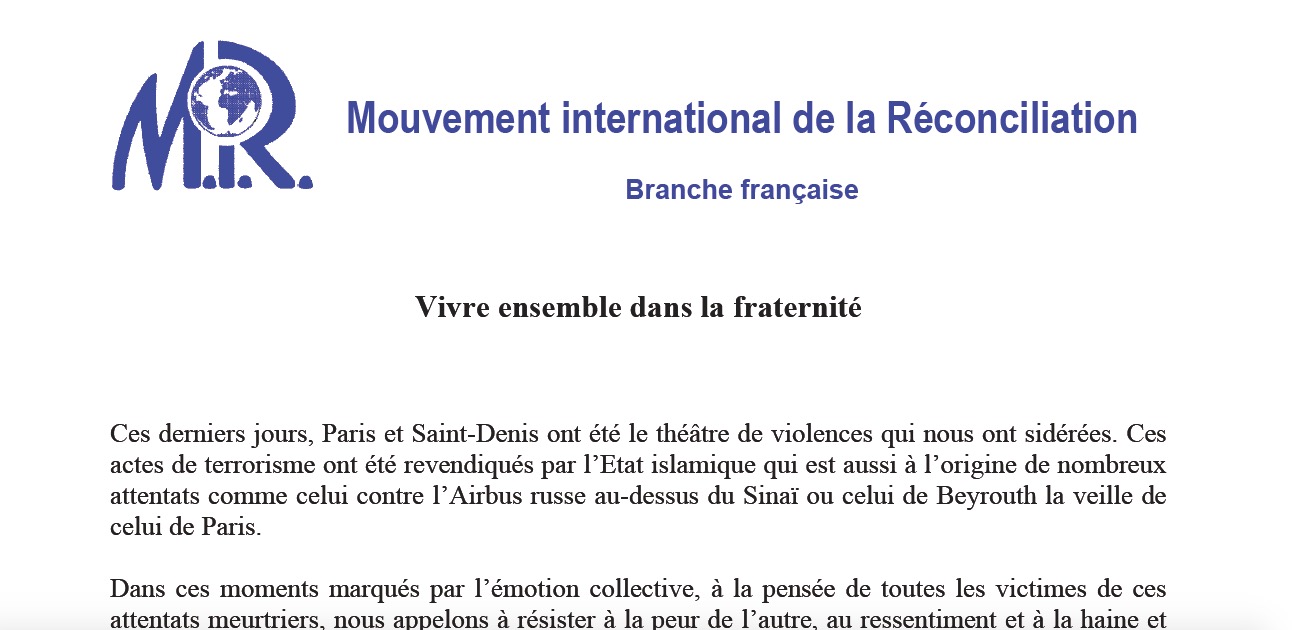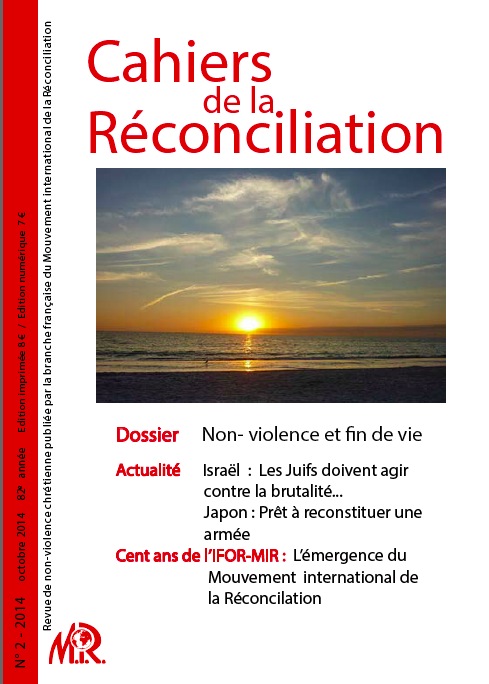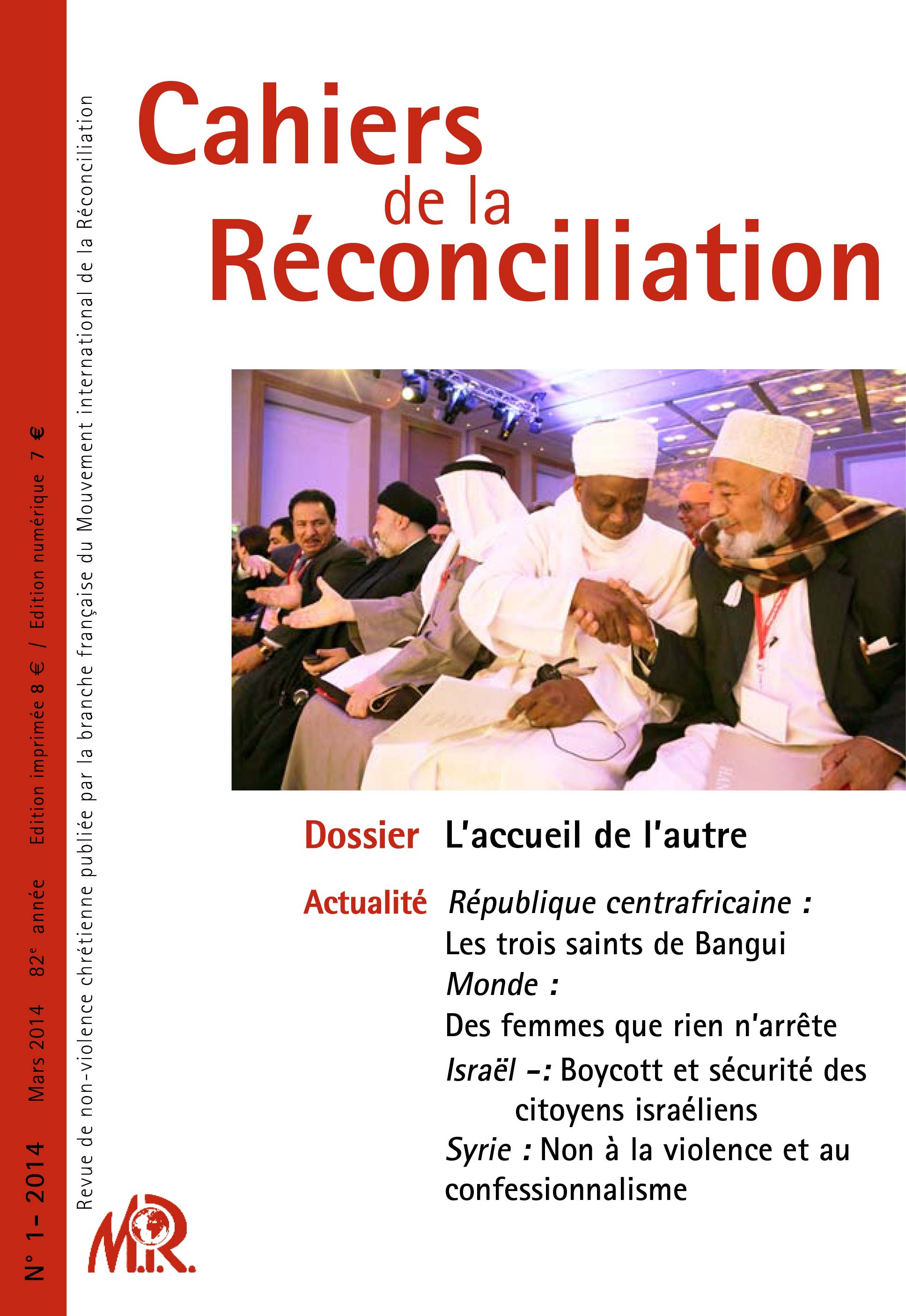English Below
Paris, 9-10 juin 2023
Les cent ans de la branche française
du Mouvement international de la Réconciliation
Des chrétiens au service de la non-violence et de la paix
en France et dans le monde (1923-2023)
Appel à communications
Les propositions de communication sont à adresser à Christian Renoux (Université d’Orléans-POLEN) avant le 31 décembre 2022 : christian.renoux [at] univ-orleans.fr.
En 1923, un groupe d’étudiants de la Faculté de théologie protestante de Paris invite Oliver Dryer, secrétaire général de l’International Fellowship of Reconciliation (IFOR), à venir leur présenter ce nouveau mouvement né en 1914 et organisé en 1919. De cette rencontre naît la branche française du Mouvement international de la Réconciliation (MIR).
À l’occasion de ce centenaire, un colloque historique est organisé à Paris les 9 et 10 juin 2023 avec pour ambition de faire le point sur l’histoire de ce mouvement pacifiste chrétien et non-violent marqué par un refus radical de la guerre et tout ce qui la prépare.
Le Mouvement a donné lieu à des travaux s’inscrivant dans l’histoire du pacifisme. Les publications de biographies ou d’écrits autobiographiques ceux de Jacques Martin, premier rédaction des Cahiers et Juste parmi les nations, ou d’André et Magda Trocmé, fondateurs du Collège cévenol, au Chambon-sur-Lignon, responsables du MIR et Justes parmi les nations, ont aussi donné l’occasion de nouveaux éclairages. Cependant des pans entiers de son histoire restent à explorer.
La naissance du Mouvement en France s’enracine dans le souvenir tragique de la Première guerre mondiale et le questionnement de ses premiers membres – dont les pasteurs Henri Roser, André Trocmé ou Jacques Martin – sur leur engagement en faveur de la paix et de la réconciliation en Europe, sur fonds de réarmement et de montée des périls.
Le Mouvement fut rapidement influencé par la rencontre avec Gandhi et la découverte de son engagement non-violent, à travers les liens noués tant par l’Internationale (via Muriel Lester, Charles Andrews ou Jane Addams) qu’en France lors de la conférence du Mahatma à Paris en 1931. Lors du congrès d’IFOR à Lyon en 1929, le Mouvement avait d’ailleurs repris le terme de non-violence pour définir son action.
On envisagera la période de la fondation du Mouvement et le milieu qui l’a porté, son combat en faveur de l’objection de conscience (séries de procès d’objecteurs), son travail pour la réconciliation dans l’Europe de l’entre-deux-guerres, son positionnement clair contre le fascisme, le nazisme et les Accords de Munich, la résistance civile non-violente de ses membres, en particulier dans le sauvetage des juifs pendant la Seconde Guerre mondiale.
Au sortir de la guerre, le Mouvement dut se reconstruire en gardant son engagement en faveur de l’objection de conscience tout en s’opposant à l’armement atomique et aux différentes guerres coloniales (Madagascar, Indochine, Algérie) et en appuyant les mouvements d’indépendance. La fin des années 1960 et les années 1970, sous la conduite de René Cruse, qui déclencha des tensions avec la génération des fondateurs, furent marquées par des accents plus politiques (candidature de R. Cruse aux élections législatives contre François Mitterrand dans la Nièvre pour dénoncer l’armement atomique) et la relance du combat en faveur d’un statut digne pour les objecteurs de conscience (entre la loi de 1963 et celle de 1983). Le MIR s’engage alors dans des actions collectives contre les essais nucléaires, pour l’abolition du nucléaire civil, contre l’extension du camp militaire du Larzac. Puis, au cours des années 1980, des liens sont tissés avec les indépendantistes kanaks et polynésiens. Dans les années 1990 et 2000, le MIR s’est de plus engagé dans la promotion de l’éducation à la non-violence au cours de la Décennie de l’ONU sur la culture de non-violence et de paix (2001-2010) et à travers la Coordination pour l’éducation à la non-violence et à la paix.
Le MIR participe à différentes époques au développement d’une théologie œcuménique de la non-violence en dialogue avec les diverses instances ecclésiales à différentes époques en France et à l’international (ouvrages théologiques de H. Roser, J. Lasserre et A. Trocmé, rencontres Théologie et non-violence, session de travail avec le COE en 1972).
On s’attachera également à l’étude des relations de la branche française du MIR avec les autres mouvements pacifistes et non-violents français (Quakers, Amis de Gandhi, Arche de Lanza del Vasto, UPF, MAN, NVA, Génération médiateurs, Non-violence XXI, Coordination pour l’éducation à la non-violence et à la paix) ainsi qu’avec les institutions et les mouvements protestants (Christianisme social, CIMADE).
L’étude de ses relations avec l’Internationale (IFOR) sera aussi un centre d’intérêt. L’IFOR, quoique longtemps influencé par le monde anglo-saxon, donna toujours une place aux Français : Henri Roser, André Trocmé, Jean Goss et Hildegard Goss-Mayr, Jean Lasserre, Henriette Tourne participèrent à ses instances internationales. Le secrétariat international eut son siège à Paris entre 1935 et 1938. Ambroise Monod et Marie-Pierre Bovy en furent les présidents.
La branche française entretient des relations étroites avec les autres branches européennes. Elle partagea un secrétariat avec les branches francophones et H. Roser, J. Lasserre ou R. Cruse eurent des relations privilégiées avec la branche allemande. Dans les années 1990, des liens nombreux se sont créés avec les groupes non-violents en Afrique francophone (séminaires de formation de Jean et Hildegard Goss-Mayr et présence d’Alfred Bour au Rwanda après le génocide). Ses relations avec la branche américaine du MIR influencèrent le Mouvement dès les années 1930. En 1945, les réflexions de Henri Roser sur son action durant la guerre furent publiées à New York et Magda et André Trocmé y firent des tournées de conférence à la demande de FOR US. Martin Luther King, Prix Nobel de la paix et membre de la branche du MIR américain, vint en France en 1966 à l’invitation du MIR et d’autres mouvements.
La revue du Mouvement, Les Cahiers de la Réconciliation, qui paraît dès 1926, à la fois organe de communication interne et moyen de diffusion des idées du Mouvement, permet de suivre l’évolution des engagements divers de celui-ci.
Les communications pourront être faites en français ou anglais.
Dates et lieu du colloque : Paris, 9 et 10 juin 2023
Comité scientifique :
Jean Baubérot, Président honoraire de l’École Pratique des Hautes Etudes (PSL)
Patrick Cabanel, directeur d’études à l’École Pratique des Hautes Etudes (PSL)
Noëlline Castagnez, professeur d’histoire contemporaine à l’université d’Orléans
André Encrevé, professeur d’histoire contemporaine émérite à l’université Paris-Est Créteil
Jean-Michel Guieu, maître de conférences d’histoire contemporaine à l’université Paris 1 Panthéon-Sorbonne
Thomas Hippler, professeur d’histoire contemporaine à l’université de Rouen Normandie et directeur de l’Institut pour la paix
Frédéric Rognon, professeur de philosophie des religions à l’université de Strasbourg
Jacques Semelin, directeur d’études émérite au CNRS
Organisé avec le soutien de l’Institut pour la paix, du Laboratoire POLEN de l’université d’Orléans, du MIR France et de Non-violence XXI.
Les actes du colloque seront publiés.
International Conference
Paris, 9-10 June 2023
The centenary of the IFOR French branch
Christians in the service of non-violence and peace
in France and in the world (1923-2023)
Call for papers
Proposals for papers should be sent to Christian Renoux (University of Orléans-POLEN) before 31 December 2022: christian.renoux@univ-orleans.fr
In 1923, a group of students from the Faculty of Protestant Theology in Paris invited Oliver Dryer, General Secretary of the International Fellowship of Reconciliation (IFOR), to come and introduce them to this new movement which had been born in 1914 and organized in 1919. The IFOR French branch was born from this meeting.
On the occasion of this centenary, an international conference is organized in Paris on 9 and 10 June 2023 with the aim of taking stock of the history of this Christian and non-violent pacifist movement marked by a radical refusal of war and all that prepares it.
The birth of the Movement in France is rooted in the tragic memory of the First World War and the questioning of its first members – including pastors Henri Roser, André Trocmé and Jacques Martin – about their commitment to peace and reconciliation in Europe, against a backdrop of rearmament and rising perils.
The Movement was quickly influenced by its meeting with Gandhi and its discovery of his non-violent commitment, through the links established both by the International Secretariat (via Muriel Lester, Charles Andrews or Jane Addams) and in France during the Mahatma’s conference in Paris in 1931. During the IFOR congress in Lyon in 1929, the Movement had taken up the term of non-violence to define its action.
Even if the Movement has given rise to works that are part of the history of pacifism, entire sections of its history remain to be elaborated. The publication of biographies or autobiographical writings, such as those of Jacques Martin, the first editor of the Cahiers de la Réconciliation and Righteous Among the Nations, or of André and Magda Trocmé, founders of the Collège cévenol in Le Chambon-sur-Lignon, leaders of the MIR and Righteous Among the Nations, have also provided the opportunity to shed new light.
This Conference will consider the period of the Movement’s foundation and the environment that supported it, its struggle for conscientious objection (series of objectors’ trials), its work in favour of reconciliation in Europe in the interwars period, its clear position against fascism, Nazism, and the Munich Agreements, the non-violent civil resistance of its members, in particular in rescuing Jews during the WW II.
After the war, the Movement had to rebuild itself by maintaining its commitment to conscientious objection while opposing atomic weapons and the various colonial wars (Madagascar, Indochina, Algeria) and supporting the independence movements. The end of the 1960s and the 1970s, under the leadership of René Cruse, who triggered tensions with the founding generation, were marked by more political accents (R. Cruse ran against François Mitterrand in the Nièvre legislative elections to denounce nuclear weapons) and the revival of the struggle for a dignified status for conscientious objectors (between the 1963 and 1983 laws). The MIR then engaged in collective actions against nuclear testing, for the abolition of civil nuclear power and against the extension of the Larzac military base. Then, during the 1980s, links were forged with the Kanak and Polynesian independence leaders.
The MIR participated at different times in the development of an ecumenical theology of non-violence in dialogue with various ecclesial bodies at different times in France and internationally (theological works by H. Roser, J. Lasserre and A. Trocmé, French annual meeeting on Theology and non-violence, working session with the WCC in 1972).
The Conference will also study the relations of the French branch of the MIR with the other French pacifist and non-violent movements (Quakers, Friends of Gandhi, Arche de Lanza del Vasto, UPF, MAN, NVA, Non-violence XXI, Génération médiateurs) and the Protestant movements (Christianisme social, CIMADE). In the 1990s, the MIR promoted education for non-violence and peace and of the UN Decade for a Culture of Peace and Non-Violence (2001-2010). Its co-initiated the French Coordination for this decade and then for education for non-violence and peace.
The study of relations with the International Secretariat and the other members of the International Fellowship of Reconciliation (IFOR) will also be a focus of interest. IFOR, although long influenced by the Anglo-Saxon world, always gave a place to the French: Henri Roser, André Trocmé, Jean Goss and Hildegard Goss-Mayr, Jean Lasserre, Henriette Tourne participated in its international bodies. The international secretariat was based in Paris between 1935 and 1938. Ambroise Monod and Marie-Pierre Bovy were its presidents.
The French branch specially maintains close relations with the other European branches. It shared a secretariat with the French-speaking branches and H. Roser, J. Lasserre or R. Cruse had privileged relations with the German branch. In the 1990s, numerous links were also created with non-violent groups in French-speaking Africa (trainings and seminars of Jean and Hildegard Goss-Mayr in different African countries and presence of Alfred Bour in Rwanda after the genocide). Relations with the FOR US influenced the Movement from the 1930s onwards. Henri Roser’s reflections about his actions during the WWII were published in New York in 1945 and Magda and André Trocmé made lecture tours there at the request of FOR US. Martin Luther King, Nobel Peace Prize Laureate and member of the FOR US, came to France in 1966 at the invitation of the MIR and other movements.
The Movement’s magazine, Les Cahiers de la Réconciliation, which appeared in 1926, was both an internal communication organ and a means of disseminating the Movement’s ideas, making it possible to follow the evolution of its various commitments.
Papers may be presented in French or English.
Dates and venue of the conference: Paris, 9 and 10 June 2023
Scientific Committee:
Jean Baubérot, Honorary President of the École Pratique des Hautes Etudes (PSL)
Patrick Cabanel, Director of Studies at the École Pratique des Hautes Etudes (PSL)
Noëlline Castagnez, Professor of contemporary history at the University of Orléans
André Encrevé, Professor Emeritus of contemporary history at the University of Paris-Est Créteil
Jean-Michel Guieu, Associate Professor of Contemporary History at the University of Paris 1 Panthéon-Sorbonne
Thomas Hippler, Professor of contemporary history at the University of Rouen Normandy and director of the Institute for Peace
Frédéric Rognon, Professor of philosophy of religion at the University of Strasbourg
Jacques Semelin, Emeritus Director of Studies at the CNRS
Organized with the support of the Institut pour la paix, the Laboratory POLEN of the University of Orléans, MIR France and Non-violence XXI.
The proceedings of the conference will be published.






